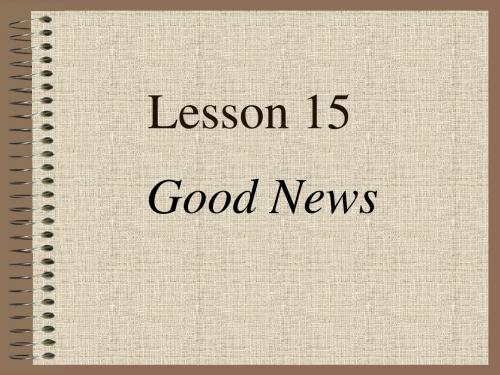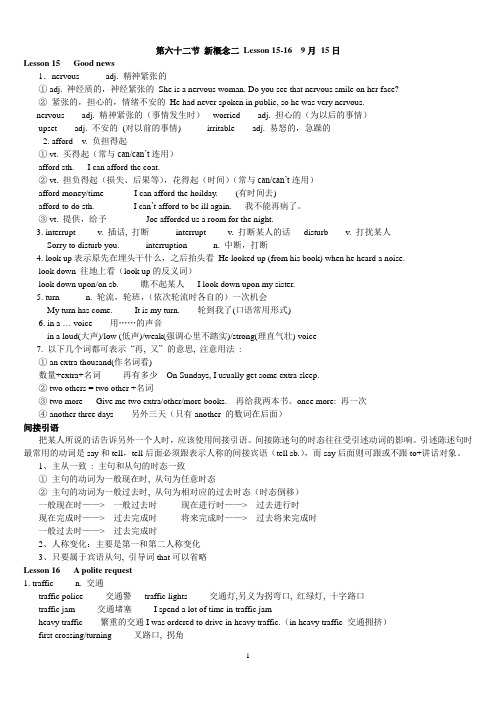11:新概念二册教案+课文听力填空 Lesson 15 Good news
- 格式:doc
- 大小:29.50 KB
- 文档页数:2



新概念英语第二册第15课第一篇:新概念英语第二册第15课Lesson 15 Good news 佳音The secretary told me that Mr.Harmsworth would see me.I felt very nervous when I went into his office.He did not look up from his desk when I entered.After I had sat down, he said that business was very bad.He told me that the firm could not afford to pay such large salaries.Twenty people had already left.I knew that my turn had come.'Mr.Harmsworth,' I said in a weak voice.'Don't interrupt,' he said.Then he smiled and told me I would receive an extra thousand pounds a year!New words and expressions 生词和短语secretary n.秘书nervous adj.精神紧张的afford v.负担得起weak adj.弱的 interrupt v.插话,打断参考译文秘书告诉我说哈姆斯沃斯先生要见我。
我走进他的办公室,感到非常紧张。
我进去的时候,他连头也没抬。
待我坐下后,他说生意非常不景气。
他还告诉我,公司支付不起这么庞大的工资开支,有20个人已经离去。
我知道这次该轮到我了。
“哈姆斯沃斯先生,”我无力地说。
“不要打断我的话,”他说。
然后他微笑了一下告诉我说,我每年将得到1,000 英镑的额外收入。

第六十二节新概念二Lesson 15-16 9月15日Lesson 15 Good news1.nervous adj. 精神紧张的① adj. 神经质的,神经紧张的She is a nervous woman. Do you see that nervous smile on her face?②紧张的,担心的,情绪不安的He had never spoken in public, so he was very nervous.nervous adj. 精神紧张的(事情发生时)worried adj. 担心的(为以后的事情)upset adj. 不安的(对以前的事情) irritable adj. 易怒的,急躁的2. afford v. 负担得起① vt. 买得起(常与can/can’t连用)afford sth. I can afford the coat.② vt. 担负得起(损失、后果等),花得起(时间)(常与can/can’t连用)afford money/time I can afford the hoilday. (有时间去)afford to do sth. I can’t afford to be ill again. 我不能再病了。
③ vt. 提供,给予Joe afforded us a room for the night.3. interrupt v. 插话, 打断interrupt v. 打断某人的话disturb v. 打扰某人Sorry to disturb you. interruption n. 中断,打断4. look up表示原先在埋头干什么,之后抬头看He looked up (from his book) when he heard a noise.look down 往地上看(look up的反义词)look down upon/on sb. 瞧不起某人I look down upon my sister.5. turn n. 轮流,轮班,(依次轮流时各自的)一次机会My turn has come. It is my turn. 轮到我了(口语常用形式)6. in a … voice 用……的声音in a loud(大声)/low (低声)/weak(强调心里不踏实)/strong(理直气壮) voice7. 以下几个词都可表示“再, 又” 的意思, 注意用法:① an extra thousand(作名词看)数量+extra+名词再有多少On Sundays, I usually get some extra sleep.② two others = two other +名词③ two more Give me two extra/other/more books. 再给我两本书。

新概念英语第⼆册第15课Lesson 15 Good NewsThe secretaryalready left. I knew that my turn had come.'Mr. Harmsworth,' I said in a weak voice.'Don't interrupt,' he said.New words and expressions ⽣词和短语1.secretary ['sekr?t?ri] n. 秘书(secret['si:krit])私⼈秘书?2.nervous [?n?rv?s] adj. 精神紧张的;3.afford [??f?rd] v. 负担得起;4.weak [wik] adj. 弱的;5.interrupt [??nt??r?pt] v. 插话,打断参考译⽂:秘书告诉我说哈姆斯沃斯先⽣要见我。
我⾛进他的办公室,感到⾮常紧张。
我进去的时候,他连头也没抬。
待我坐下后,他说⽣意⾮常不景⽓。
他还告诉我,公司⽀付不起这么庞⼤的⼯资开⽀,有20个⼈已经离去。
我知道这次该轮到我了。
“哈姆斯沃斯先⽣,”我⽆⼒地说。
“不要打断我的话,”他说。
然后他微笑了⼀下告诉我说,我每年将得到1,000 英镑的额外收⼊。
1.The secretary told me that Mr. Harmsworth would see me.2.I felt very nervous when I went into his office.3.He did not look up from his desk when I entered.4.After I had sat down, he said that business was very bad.5.He told me that the firm could not afford to pay such large salaries.6.Twenty people had already left.7.I knew that my turn had come.8.'Mr. Harmsworth,' I said in a weak voice.9.'Don't interrupt,' he said.10.T hen he smiled and told me I would receive an extra thousand pounds a year!参考译⽂1.秘书告诉我说哈姆斯沃斯先⽣要见我。

Lesson 15 Good news 佳音news [nju:z] n.1. [u]消息;音信有什么最新消息吗?What’s the latest ([leitist]adj. 最近的;最新的) news?这真是好消息。
That’s great news.把你最近的情况全都告诉我。
Tell me all your news.你是想先听好消息还是坏消息?Do you want the good news or the bad news first?一条/一则消息 a piece/bit of news2. [u]媒体对重要事情的报道;新闻e.g. 国内/国际新闻 national/international news她老上报纸。
She is always in the news.3. (the news) (电视或广播中的)新闻节目e.g. 收听/收看新闻节目 to listen to / watch the news九点的新闻报道 the nine o’clock news4. [u]新闻人物;新闻事件e.g. 流行音乐明星们总是新闻人物。
Pop stars are always news.1. be bad news (for sb./sth.)对…不利e.g. 中央供暖系统可能不利于室内植物。
Central heating is bad news for indoor plants.2. break the news (to sb.)最先(向…)透露坏消息;说出实情3. be good news (for sb./sth.) 对…有利(或有益处)4. no news is good news (saying)没有消息就是好消息单词讲解1、secretary ['sekrətəri] n.秘书secret ['si:krit] n. 秘密tell a secret 告诉一个秘密keep a secret 保守秘密the secret of success 成功的秘密an open secret 一个公开的秘密in secret 秘密地secret adj. 秘密地,保密的,不公开的a secret marriage 一次秘密的婚礼 a secret document 一份秘密的文件secretive ['si:krɪtɪv] adj. 喜欢保守秘密的,守口如瓶的eg. He is rather secretive about his personal problems. 他对自己的个人问题守口如瓶。
Lesson 15Good news一、教学时数三课时,一百二十分钟二、教学对象初中一年级学生三、教学目标1、知识目标:(1)学生认读本课新单词和短语,并能够听写出来。
(2)学生能认读理解本课课文,并能够复述出本课的课文内容。
(3)学生掌握间接引语的构成和用法。
(4)学生掌握3组易混淆词:nervous、irritable;office、study、desk;afford.2、能力目标:(1)学生能区分并自主分析3组易混淆词:nervous、irritable;office、study、desk;afford.四、教学重点(1)认读理解本课新单词,短语和课文。
(2)掌握间接引语的构成和用法。
(3)学生掌握3组易混淆词:nervous、irritable;office、study、desk;afford.五、教学难点(1)间接引语的构成和用法。
(2)3组易混淆词:nervous、irritable;office、study、desk;afford.(3)单词发音:secretary、nervous、interrupt.六、教学评估(1)通过one by one认读新单词的方式,达到对新单词能准确发音的目的。
未听见有明显读错为合格。
(2)通过回答教师提问的方式,达到能掌握本课课文内容的目的。
能够正确回答问题为合格。
(3)通过教师说中文意思,学生回答英文单词的方式。
达到能准确说出新单词及记忆其中文意思的目的。
能够正确说出相应的英文单词为合格。
七、教学资源教材《NCE-2》、音频、视频、单词卡片、QUIZ八、教学步骤步骤一:热身导入(1)背诵Lesson14课文。
(2)检查并点评Lesson14摘要写作。
(3)检查并讲解Lesson14课后习题。
(4)复习抽查:过去完成时、3组易混淆词:ask、ask for;except、expect for、apart from;which of、either of、neither of、both of.步骤二:单词、课文和语法点的学习1、单词学习:(1)教师让学生一个接一个地拼读新单词,教师听音纠正。
新概念英语第二册第15课:Good newsLesson 15 Good news佳音First listen and then answer the question.听录音,然后回答以下问题。
What was the good news?The secretary told me that Mr Harmsworth would see me. I felt very nervous when I went into his office.秘书告诉我说哈姆斯沃斯先生要见我。
我走进他的办公室,感到非常紧张。
我进去的时候He did not look up from his desk when I entered. After I had sat down, he said that business was very bad.他连头也没抬。
待我坐下后,他说生意非常不景气He told me that the firm could not afford to pay such large salaries. Twenty people had already left.他还告诉我,公司支付不起这么庞大的工资开支,有20个人已经离去I knew that my turn had come.我知道这次该轮到我了'Mr Harmsworth' I said in a weak voice.“哈姆斯沃斯先生”我无力地说'Don't interrupt' he Said.“不要打断我的话”他说Then he smiled and told me I would receive an extra &1000 a year!然后他微笑了一下告诉我说,我每年将得到1,000 英镑的额外收入!New words and expressions 生词和短语secretaryn. 秘书nervousadj. 精神紧张的affordv. 负担得起weakadj. 弱的interruptv. 插话,打断Notes on the text课文注释1 look up,抬头看。
中文名_________ Name________ Class: 新概念二上11/24 Teacher: Bill Date: Saturday(17:30-19:30)
Lesson 15 Good news 佳音
【New words and expressions】生词和短语
★secretary n. 秘书注意读音
★nervous adj. 精神紧张的
be nervous 事情发生时
worried : 为以后的事情担心
upset:不安的(对以前的事情)
★afford v. 负担得起
1、afford sth. : I can afford the coat (东西) I can afford the holiday.有时间去
2、afford money/time : I can afford five yuan./I can afford the book.
afford to do sth. : I can afford to buy the book.
(can/can’t)afford sth.前面一般都要加情态动词“can/can’t”
★weak adj. 弱的
★interrupt v. 插话, 打断
(n.)interruption disturb : 打扰某人interrupt : 打断某人的话Sorry to...
【课文讲解】
look down upon/on sb : 瞧不起某人I look down upon my sister.
I look down 往地上看,反义词: look up
Business is very good! 生意好!
The firm could not afford to pay such large salaries.(此句要求背诵)
collect salary 领薪水pay salary 支付薪水
large:一般指东西的数量so的后面加形容词或副词
such的后面加名词, 容许在该名词前面加修饰词
所有的间接引语都是宾语从句
My turn has come. It is my turn.轮到我了(口语常用形式)
in a ... Voice in a loud(大声)/low (低声)/weak(强调心里不踏实)/strong(理直气壮) voice
以下几个词都可表示“再, 又” 的意思, 注意用法:
1、an extra thousand(作名词看) 再有多少: 数量+extra+名词
2、two others : two other +名词
3、two more : two more chairs
4、once more: 再一次
5、another three days : 只有another 的数词在后面
【Key structures】关键句型
间接引语(宾语从句) : 是陈述句的间接引语.
一、主从一致: 主句和从句的时态一致
1.主句的动词为一般现在时, 从句为任意时态
2.主句的动词为一般过去时, 从句为相对应的过去时态
(过去时: 一般过去时, 过去进行时, 过去完成时, 过去将来时)
一般现在时——一般过去时
现在进行时——过去进行时
现在完成时——过去完成时
将来完成时——过去将来完成时
一般过去时——过去完成时
二、人称变化: 主要是第一和第二人称变化, 设身处地
三、只要属于宾语从句, 引导词that可以省略
Exercises B
1 He ______ me that she ______ (come)tomorrow.
2 The gardener ______ that he ______ (cut)that tree down yesterday.
3 I ______ you I ______ (have)never played tennis before.
4 What ______ he ______ that he ______ (do)?
5 When ______ he ______ you that he ______ (buy)this car?
6 He ______ he ______ (cannot)understand me.
7 He ______ that he ______ (work)all day yesterday.
8 He ______ me he never ______ (write)letters to anybody.
9 Why ______ you ______ that you ______ (be) busy?
10 He ______ that he ______ (will wait)for me.
后面有“人” 用tell,否则用say
先根据原句填时态, 再把这句话放到整篇文章中检验
(1)每天听本课录音,最少一遍。
(2)跟读本课录音,每天最少一遍。
(3)背诵Lesson 15:Good news.
(4)要求:模仿CD做到发音清楚,标准,背诵流利。
(5)终极挑战,背诵默写全文
(6)额外挑战:把本课背诵视频(1分钟内)发给BILL,每月播放量前十可获得积分卡。
5.did; tell; had bought 6.said; couldn't 7.said; had worked 8.told; had never written 9.did; say; were busy 10. said; would wait。